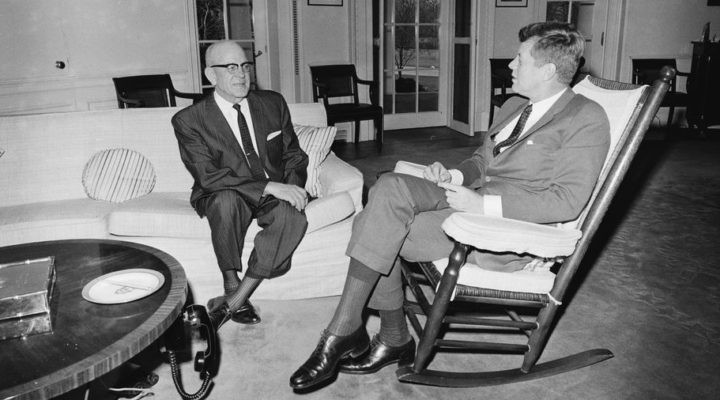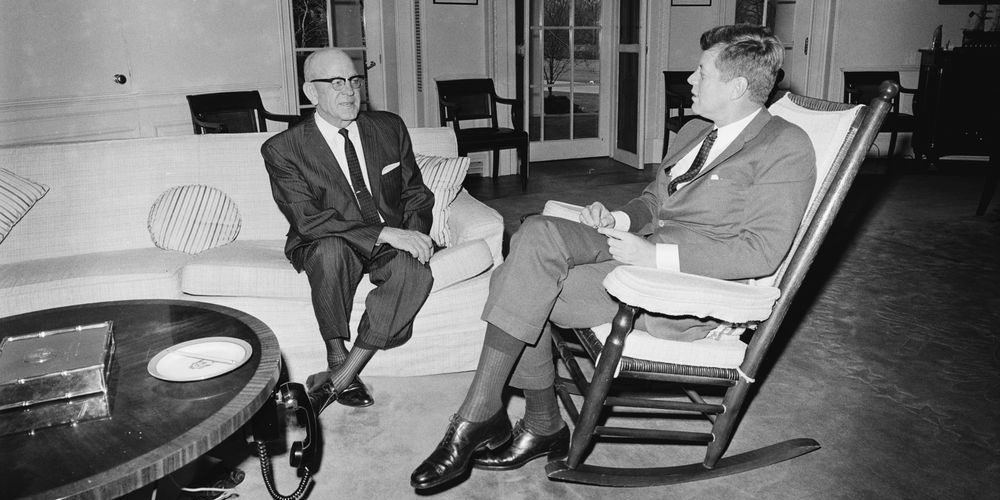Much has been written about evangelical Christian support for President Donald Trump — believed to be a key to his election in 2016 — but attention this year is turning also to the Catholic vote as a pivotal bloc.
Joe Biden is only the fourth Catholic major-party presidential nominee in U.S. history. The others were John Kerry in 2004, John F. Kennedy in 1960 — the only Catholic ever elected president — and Al Smith in 1928.
Biden also became the first and only Catholic vice president in U.S. history when elected alongside Barak Obama in 2008 and 2012. Notably, Hillary Clinton’s running mate in 2016, Tim Kaine, is an active Catholic.
Who is a “true” Catholic?
This year, a war of words is playing out in social media and in Catholic congregations nationwide, as some Catholic priests have become vocal in support of either Biden or Trump — sometimes claiming a true Catholic can only vote one way.
Leading the pack in such declarations is James Altman, pastor of St. James the Less Catholic Church in La Crosse, Wisc. On Aug. 30, he released a professionally produced video that includes this emphatic statement: “You cannot be Catholic and be a Democrat.”
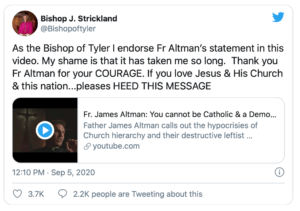 Other priests, including Bishop Joseph Strickland of Tyler, Texas, have endorsed Altman’s video and shared it. “If you love Jesus and this church and your nation, please heed this message,” Strickland tweeted along with a link to Altman’s video.
Other priests, including Bishop Joseph Strickland of Tyler, Texas, have endorsed Altman’s video and shared it. “If you love Jesus and this church and your nation, please heed this message,” Strickland tweeted along with a link to Altman’s video.
Altman’s video mixes images of Biden and House Speaker Nancy Pelosi, also a Democrat, with narration about “godless politicians.” He quotes Pope Benedict XVI to say that while the Catholic Church is not a “political” organization, it is a “moral” organization and therefore must concern itself with politics.
“When politicians act in an immoral way, we do have a duty to speak up about it,” he says, with no mention of the alleged immoralities and improprieties committed by Trump and his administration.
“Here’s a memo to clueless baptized Catholics out there: You cannot be Catholic and be a Democrat. Period. Their party platform is absolutely against everything the Catholic Church teaches,” Altman asserts.
He goes on to explain that he has “done the math” and determined that the number of true Catholics who voted for Obama in 2008 and 2012 is “zero.” Those who voted for Obama may have masqueraded as Catholics but are not, in fact, true Catholics, he declared.
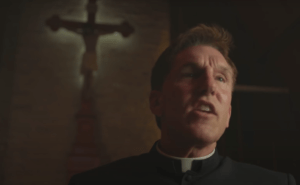
James Altman in a screenshot from his video on why Catholics cannot vote for Democrats.
No Democrat will enter heaven, he added: “There will be 60 million aborted babies standing at the gates of heaven barring your Democrat entrance. … There should be no confusion among any Catholic.”
To them he offered this pastoral counsel: “Repent of your support of that party and its platform or face the fires of hell. Yes, Virginia, there is a hell.”
The priest calls climate change a “hoax,” calls Black Lives Matter a movement for “Marxist protesters,” calls DACA recipients “criminal illegal aliens” and labels the Catholic hierarchy as bishops “who cover up truth through a conspiracy of fear.”
The video begins with a prayer, is laced with religious phrases of adoration and ends with a declaration that “our purpose in life is to know, love and serve God.”
Taking aim at James Martin
Altman takes repeated swipes at a fellow priest, James Martin, a Jesuit who is on special assignment with the Vatican and is nationally known as a commentator on issues of public life and faith. Martin offered a prayer at the Democratic National Convention but was not an agenda speaker.
Altman labeled Martin a “hyper confusion-spreading heretic” and then complained: “I guess it’s OK for James Martin to spout off for Democrats on their national stage, but God forbid a priest speak out against their godless platform.”
Martin responded on Twitter with a call for bipartisanship in the church.
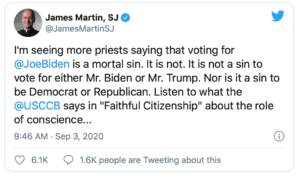 “Dear friends: I’m seeing more priests saying that voting for Joe Biden is a mortal sin. It is not. It is not a sin to vote for either Mr. Biden or Mr. Trump. Nor is it a sin to be Democrat or Republican. Listen instead to what the United States Conference of Catholic Bishops says in their helpful document Faithful Citizenship about the role of conscience,” Martin wrote.
“Dear friends: I’m seeing more priests saying that voting for Joe Biden is a mortal sin. It is not. It is not a sin to vote for either Mr. Biden or Mr. Trump. Nor is it a sin to be Democrat or Republican. Listen instead to what the United States Conference of Catholic Bishops says in their helpful document Faithful Citizenship about the role of conscience,” Martin wrote.
That document says bishops “do not intend to tell Catholics for whom or against whom to vote. Our purpose is to help Catholics form their consciences in accordance with God’s truth. We recognize that the responsibility to make choices in political life rests with each individual in light of a properly formed conscience, and that participation goes well beyond casting a vote in a particular election.”
Catholic leaders call for vote against Trump
On Sept. 9, a group of more than 150 Catholic leaders and laity signed an open letter urging Catholic voters to reject Trump in this November’s election.
“Politics must serve human dignity and the common good. This presidential election is the most consequential of our lifetime,” the letter states. “We feel compelled to speak out because President Trump flouts core values at the heart of Catholic social teaching, threatens foundational democratic principles and shows disdain for basic decency.
“The same president who used a Bible as a political prop for a photo opportunity in front of a church defiles the Gospel in his words and policies. A consistent pattern of racism, sexism and nativism defines this presidency. While neither political party or candidate reflects the fullness of Catholic teaching on every issue, President Trump’s character, policy decisions and cruelty toward anyone who challenges him demonstrates a fundamental contempt for what it means to be a Christian.”
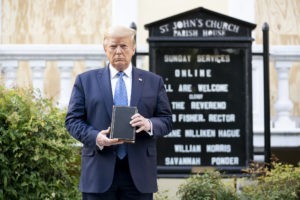
President Trump Visits St. John’s Episcopal Church in a controversial photo op during protests over racial injustice in Washington, D.C.
The letter recalls that Trump described himself as the “best president in the history of the Catholic Church” during a conference call with Catholic bishops, and that Trump boasts about his “pro-life” record.
“There is nothing pro-life about spreading disinformation about COVID-19, sending refugees and asylum-seekers back to certain death, reinstituting the federal death penalty, policies that worsen climate change, and exploiting racism for political advantage,” the letter replies. “We encourage Catholic voters to use a tool of Catholic social teaching — see, judge and act — to reflect on the signs of our times, and vote in ways that further justice and the common good.”
Biden as faithful Catholic
The Biden campaign recently launched an effort to convince Catholic voters that the Democratic candidate embodies their values and can bring healing to a divided nation. A “Catholics for Biden” virtual campaign event Sept. 4 featured faith leaders and political leaders, including Sister Simone Campbell, executive director of the social justice lobbying group Network.
“White Catholics have gotten it wrong in the past,” Campbell said. “Catholics have got to make sure we get it right this time.”
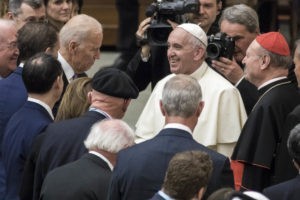
Pope Francis shakes hands with U.S. Vice President Joe Biden as he celebrates a special audience with participants at a congress on the progress of regenerative medicine and its cultural impact in the Paul VI hall in Vatican City in 2016. (Photo by Giuseppe Ciccia/Pacific Press)
America magazine, a Catholic-perspective publication, reported this: “Network’s political arm earlier this year said Catholics should not vote for Mr. Trump and it is running social media ads against the president. In a recent email to supporters, Sister Campbell wrote, ‘Catholics cannot be true to their faith and vote for Donald Trump in November.’”
America also quoted Stephen Schneck, a retired professor at the Catholic University of America, challenging Trump’s pro-life record. “In his four harrowing years, President Trump has proven himself to be, in my estimation, the least pro-life president in history,” Schneck said, pointing to the president’s efforts to repeal the Affordable Care Act and his mishandling of the COVID-19 pandemic, which has killed more than 180,000 Americans. “This is not a pro-life president.”
For its part, the Biden campaign is playing up the candidate’s Catholic faith as a positive. On the campaign website, in a section on Biden’s vision for America, he is quoted: “I’m a practicing Catholic. I believe faith is a gift. And the first obligation we all have is, ‘Love your God,’ the second one is, ‘Love your neighbor as yourself.’”
Trump and Catholics
Meanwhile, the Trump campaign responded by attacking Biden’s running mate, Kamala Harris as “anti-Catholic.”
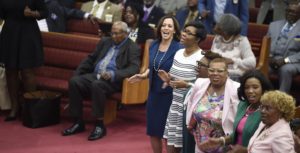
Kamala Harris worships at Royal Missionary Baptist Church on Sunday, Sept. 22, 2019, in North Charleston, S.C. (AP Photo/Meg Kinnard)
The New York Times explained: “The charge stems in part from questions Harris posed in 2018 to a federal judicial nominee about his membership in the Knights of Columbus, a lay Catholic fraternal organization. Harris asked the nominee if he agreed with the anti-abortion views of the group’s leader, views that broadly align with the church’s stance. It inflamed Republicans at the time, with one senator authoring a resolution to affirm the constitutional ban on religious tests for federal officials and state that membership in the Catholic group is not ‘disqualifying.’ Now that Harris is Biden’s running mate, conservatives are replaying the moment to try to chip at the pro-abortion-rights Democratic ticket’s appeals to religious voters.”
The Trump campaign historically has focused on evangelical Christians more than Catholic Christians, but with Biden’s record as a devout Catholic, that may be changing.
“Catholics were of secondary importance to the Trump campaign in 2016, behind evangelicals. That hasn’t changed, but there is at least an effort to reach this community now,” former GOP Rep. Tim Huelskamp of Kansas told Politico in January. Huelskamp is a senior political adviser for CatholicVote.org.
How Catholics vote
According to Frank Newport of the Gallup Organization, Catholics comprise about 23% of the American electorate. Also, Catholics have above average representation in key swing states — New Mexico, New Hampshire, Wisconsin and Pennsylvania.
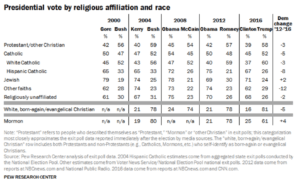 “But the challenge for a Catholic candidate like Biden is the lack of evidence that Catholics in any way vote as a bloc or that their religion differentiates them from all other voters,” Newport wrote. “In fact, the remarkable finding in the current era is the degree to which Catholics mirror almost exactly the national average on political indicators. This is significantly different from other religious groups who have much more distinct political profiles — including evangelical Protestants and Mormons, who skew very Republican, and Jews, Muslims, and ‘nones’ (those with no formal religious identity) who skew Democratic.”
“But the challenge for a Catholic candidate like Biden is the lack of evidence that Catholics in any way vote as a bloc or that their religion differentiates them from all other voters,” Newport wrote. “In fact, the remarkable finding in the current era is the degree to which Catholics mirror almost exactly the national average on political indicators. This is significantly different from other religious groups who have much more distinct political profiles — including evangelical Protestants and Mormons, who skew very Republican, and Jews, Muslims, and ‘nones’ (those with no formal religious identity) who skew Democratic.”
In the 2016 presidential election, 52% of the overall Catholic vote went for Trump, compared to 45% to Hillary Clinton. However, among white Catholics, 60% voted for Trump and 37% voted for Clinton.
In the four previous presidential elections, a majority of Catholics voted for the Republican candidate only once — 52% for George W. Bush over John Kerry — but majorities of white Catholics chose the Republican candidate every time, although never at the level of the white Catholic vote for Trump in 2016.
Hispanic Catholics, on the other hand, overwhelmingly favored the Democratic presidential candidate in 2000, 2004, 2008, 2012 and 2016.
American attitudes about Catholic candidates
Since 1937, Gallup has asked Americans if they would vote for an otherwise well-qualified person for president who happened to be Catholic.
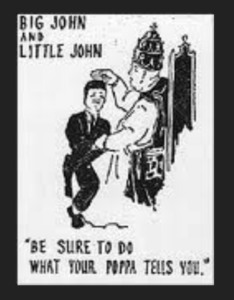
Anti-Catholic propaganda piece from 1960.
In 1937, 30% of Americans said they would not vote for a Catholic. By late 1959, shortly before John F. Kennedy’s campaign, 25% said they would not vote for a Catholic. However, after Kennedy’s election, public opposition to Catholic presidential candidates declined, falling to 13% after Kennedy’s inauguration and dropping to single digits by 1967 — the level where opposition has remained.
Baptists were a key bloc of concern for the Kennedy campaign in 1960. At that time, much of the American South was still Democratic territory, which meant Kennedy — a wealthy New England Catholic — had to win over Southern Protestants who were wary of papal influence.
One of Kennedy’s harshest critics in 1958 was E.S. James, then-editor of the Baptist Standard, weekly newspaper of Texas Baptists. At the time, the Standard enjoyed enormous influence, and its editorials carried weight with hundreds of thousands of clergy and laity across the Lone Star State and beyond.
James wrote often about his theological problems with the Catholic Church, which carried over into his dismay about a Kennedy presidential run. In February 1960, he wrote an editorial titled “Mr. Kennedy’s Candidacy.” In it, he said if America must have a Catholic president, “perhaps Kennedy would be as good as could be found.”
However, two things were essential, James said, before America ever should have a Catholic as president: “There must be a renunciation of allegiance to the foreign religio-political state at the Vatican, and there must be a declaration of freedom from the domination of the clergy by American Catholic citizens.”
Then James added: “As for me and my house, we will never support a Catholic for president until that church in America makes two changes.”
James was known as a staunch church-state separationist, which animated his disdain for a Catholic president due to fears of Vatican control. In this day, it was common for Baptists to refer to Catholics as “papists” or to disdain the problem of “popery.”
In his book Prophets with Pens, Presnall Wood tells the story of how James came to change his mind about Kennedy after the election.
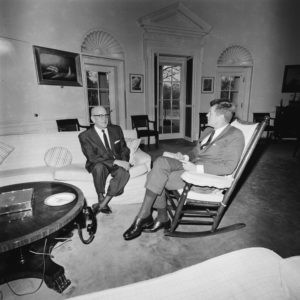
President John F. Kennedy (in rocking chair) meets with E.S.James, editor of the Baptist Standard, in the Oval Office, in February 1963.
“When Kennedy took a firm stand for separation of church and state, James sent him a telegram which read: ‘You know the Baptist Standard opposed your election for fear of the position your church leadership would take on the separation of church and state. Just as sincerely and forcefully do we now praise you for your courageous statesmanship in the face of its opposition. … To many of us the separation of church and state is dearer than life itself, and in your determination to uphold the constitutional government we have found a valiant friend.”
In February 1963, Kennedy invited James to the White House. When Kennedy was assassinated in Dallas nine months later — within walking distance of the Baptist Standard offices — James wrote an editorial saying that in Kennedy “Southern Baptists have had no better friend in the White House.” And at the invitation of the Kennedy family, the Baptist editor attended the funeral of the nation’s first, and so far only, Catholic president.
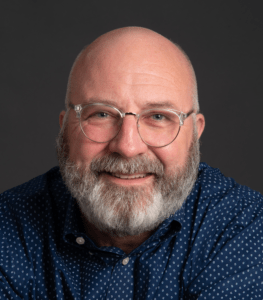 Mark Wingfield serves as executive director and publisher of Baptist News Global. He is the author of three books: Why Churches Need to Talk About Sexuality, Hanging By a Thread, and Why the Conventional Wisdom About Traditional Churches Is Wrong.
Mark Wingfield serves as executive director and publisher of Baptist News Global. He is the author of three books: Why Churches Need to Talk About Sexuality, Hanging By a Thread, and Why the Conventional Wisdom About Traditional Churches Is Wrong.
More by Mark Wingfield:

